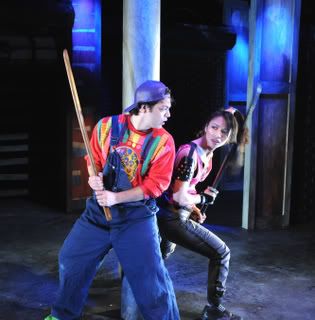Based on the Grimm fairy tale, this colorful kids' show with music is a decent hour-long holiday amusement for the little ones.
It could have been more. Like much children's theater, it suffers from over-sweetification rooted in an assumption that anything potentially disturbing or even strange must be excised, like a suspicious freckle, from entertainment designed for children. In this case, though, the result is not so much simplification as scattering; the production is all over the place.
Some of this is for the good, from a theatrical standpoint. The story has been changed in a number of ways, including the addition of a framing device, and given some modern cultural twists having to do with identity.  There's no slaying of monsters or beasties in this version, which is nice, especially for the holiday season. And a number of new characters provide amusing scenery-chewing opportunities for some good actors.
There's no slaying of monsters or beasties in this version, which is nice, especially for the holiday season. And a number of new characters provide amusing scenery-chewing opportunities for some good actors.
The most random-seeming addition is the Scarlet Pimpernel, shoehorned in from a completely different story but played with pleasingly foppish vanity by Brian Barnhart. A threatening Ogre turns out to be more Shrek-like than dangerous, a witch proves far less scary than that Wicked One of the West, and another feared monster turns out to be something quite smaller and meeker.
In the Grimm (and grimmer) original, a little tailor kills seven flies with one strike, and as a result comes to fancy himself a great hero. Stitching himself a belt bearing the motto "Seven in One Blow," he goes off to seek his fortune. It's a great kids' story because it's all about imagination. Folks all around, including the royal family and some mean giants, believing the motto refers to seven men, honor and elevate the tailor for his battle prowess, but still betray him at every possible opportunity. Like any good kids' hero, he's both brave and clever, defeating powerful enemies by outwitting them. (He also gets the girl.)
In this play the tailor is, reasonably enough, turned into an actual kid, and rather than killing the baddies, as in a traditional quest saga like the Twelve Labors of Hercules or The Wizard of Oz, this hero wins their respect and turns them into allies. It's a questionable plot change, as a) the real world does contain real baddies, and b) sometimes one does have to live by one's wits. But it's a nice excuse for songs, bright costumes, and amusing mugging.
All in all this is a diverting show for kids up to about eight years old. (The nine-year-old I brought gave it the equivalent of one thumb up.)
Seven in One Blow, or The Brave Little Kid runs weekends through Dec. 13 at the Axis Theatre, 1 Sheridan Square, just off Seventh Avenue in Greenwich Village, New York City. The Dec. 11 performance is a benefit for St. Jude Children's Hospital.


 Jane’s (Julianne Nicholson) husband died a year ago, leaving her with a school-age daughter. Her friend Marrell (Eisa Davis), a brand-new mom herself, has in mind to break Jane out of her widowy slump by introducing her to handsome Jean-Pierre (Louis Cancelmi), a French “Doctor Without Borders.”
Jane’s (Julianne Nicholson) husband died a year ago, leaving her with a school-age daughter. Her friend Marrell (Eisa Davis), a brand-new mom herself, has in mind to break Jane out of her widowy slump by introducing her to handsome Jean-Pierre (Louis Cancelmi), a French “Doctor Without Borders.” Misunderstanding and tragedy carry the day, until the truth comes out years later when it's too late.
Misunderstanding and tragedy carry the day, until the truth comes out years later when it's too late. The hero is a true artist in both senses. He is a wizard with words, a poet, a playwright, even a kind of "artist" with his sword. At the same time, he is supremely "artful" – a kind of trickster, a deceiver, though one with only the noblest of intentions. The pain that motivates him produces many of the play's comical elements as well as its ultimate tragedy.
The hero is a true artist in both senses. He is a wizard with words, a poet, a playwright, even a kind of "artist" with his sword. At the same time, he is supremely "artful" – a kind of trickster, a deceiver, though one with only the noblest of intentions. The pain that motivates him produces many of the play's comical elements as well as its ultimate tragedy.
